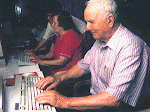Houston, TX - As rates of opioid withdrawal in newborn infants continue to rise in the United States, more hospitals are developing neonatal mindfulness programs to help these young patients with symptom management.
 |
| A certified neonatal mindfulness coach, shown here helping newborn Jiminy Miller harness the intent to evaluate how he feels |
"Few experiences in medicine are as morally fatiguing as watching a baby suffer through the symptoms of opioid withdrawal," Mort Fishman, MD, a neonatologist and certified neonatal mindfulness coach at Texas Children's Hospital (TCH) in Houston, explained. "We are always looking for effective options that reduce discomfort and the amount of time that a baby stays in the hospital, and that don't require lengthy courses of oral medications. I couldn't be happier with the success of our mindfulness program."
Neonatal mindfulness is more than simply a means of creating meaningful lifestyle changes in babies that are less than a month old. According to Fishman, there are several proven layers of intervention that combine to achieve a powerful effect. "Intentional breathing, focused awareness, and the acceptance of their experience is key to overcoming dependence. These sessions take place as often as needed to assist each baby in taking ownership of their thoughts."
Each baby that is enrolled in a neonatal mindfulness program is monitored closely by hospital staff, as well as a caregiver whenever available. Specific signs of withdrawal, such as sweating, tremors, or diarrhea, are less of a focus than with other approaches to withdrawal. Instead, Fishman adds, we pay close attention to successful feeding, their ability to sleep, and how difficult it is to console the baby:
We look at the individual baby, how they are doing from a holistic perspective, and if these key determinants of self-actualization are being impacted by having been exposed to opioid medications during intrauterine development. And honestly, we have a pretty low threshold to intervene.
When a baby's nurse or caregiver feels like help is needed, they begin with fundamental actions that help to establish an environment where mindfulness has the best chance to succeed. This includes skin-to-skin contact or snug swaddling, frequent feeding, and holding the baby in a quiet room with low light and minimal noise. This control of the baby's environment allows them to focus on reflection and observation, which is a foundation upon which they might better be able to make informed decisions and to respond with agency rather than simply lashing out emotionally.
 |
| 5-day-old Whilliker Smith, shown here failing to establish a non-judgmental attitude and a reconnection with intention |
Neonatal psychologists, experts in a new but increasingly acknowledged field, have written on the importance of experience and choosing peaceful reactions to environmental variables that might seem out of the baby's control. Nance Rothfield, a neonatal psychologist and head of the mindfulness program at TCH, believes that a newborn's ability to choose how they respond to people, thoughts, emotions, and events is an innate skill that they all possess. "Baby's are explorers, not only of their environment but of the vast inner workings of their own subconscious mind. Their ability to develop characteristics of mindfulness flows as they test out new ways to adjust their behaviors. It's a natural and beautiful thing."
According to Rothfield, the characteristics of mindfulness come in phases, the first and most important of which is intention. "Once established, intention flows into attention, the harnessing of intention to assess our own feelings. Finally comes a non-judgmental attitude that dictates how we respond to distractions and detours in our lives, ideally with emergence and a reconnection. When that becomes an automatic response, they usually find that they don't need the opioids in their lives anymore."

No comments:
Post a Comment